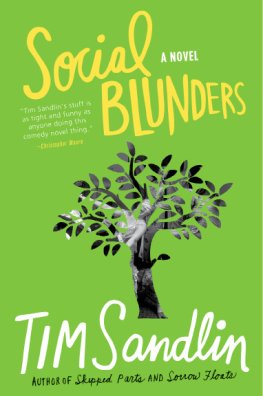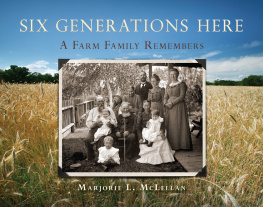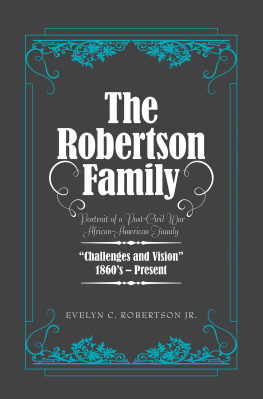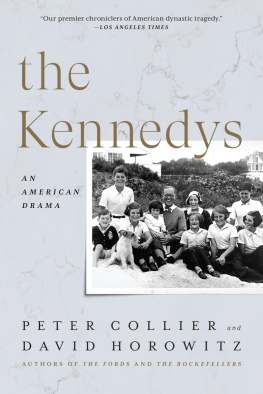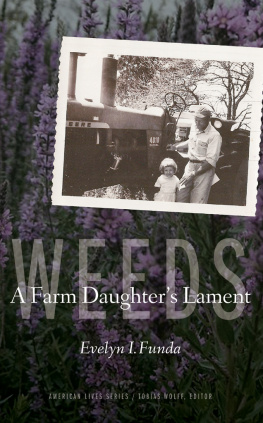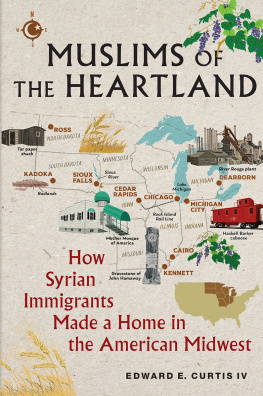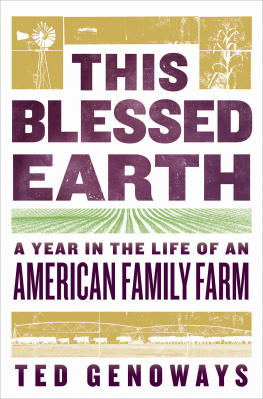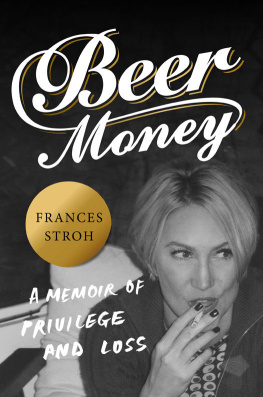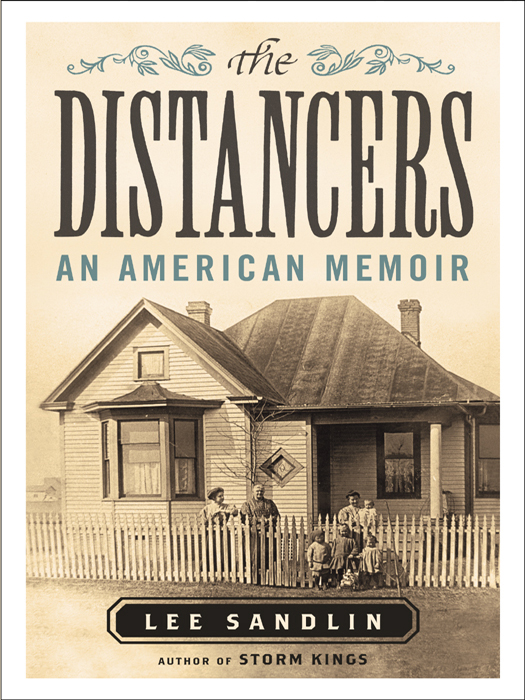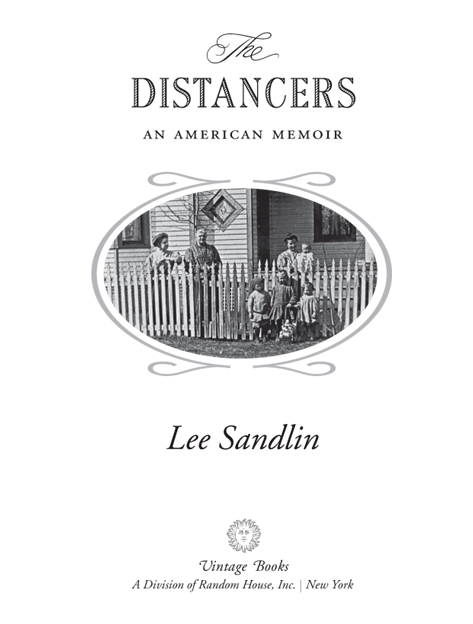Lee Sandlin
The
DISTANCERS
Lee Sandlin is the author of Wicked River: The Mississippi When It Last Ran Wild and reviews books for The Wall Street Journal. His essay Losing the War was included in the anthology The New Kings of Nonfiction. He lives in Chicago.
ALSO BY LEE SANDLIN
Wicked River:
The Mississippi When It Last Ran Wild
Storm Kings:
The Untold History of Americas First Tornado Chasers
A VINTAGE ORIGINAL, JULY 2013
Copyright 2004, 2013 by Lee Sandlin
All rights reserved. Published in the United States by Vintage Books, a division of Random House, Inc., New York, and in Canada by Random House of Canada Limited, Toronto.
Vintage and colophon are registered trademarks of Random House, Inc.
This work was originally serialized, in slightly different form, in the Chicago Reader, in 2004.
Library of Congress Cataloging-in-Publication Data:
Sandlin, Lee.
The distancers : an American memoir / Lee Sandlin.
pages cm.
eISBN: 978-0-345-80677-2
1. Sandlin, Lee. 2. Sandlin, LeeFamily.
3. German AmericansMiddle WestBiography.
4. Middle WestSocial Life and customs.
5. Middle WestBiography. I. Title.
CT275.S2584A3 2013
920.00977dc23
[B] 2013011901
www.vintagebooks.com
Cover design by Cardon Webb
Photograph courtesy of the author
v3.1
FOR ALISON TRUE
sed tua me virtus tamen et sperata voluptas
suavis amicitiae quemvis sufferre laborem
suadet et inducit noctes vigilare serenas
Though for no other cause, yet for this: that posterity may know we have not loosely through silence permitted things to pass away as in a dream.
RICHARD HOOKER ,
Of the Laws of Ecclesiastical Polity (1594)
Contents
Just Shy of the Mississippi
Boshs Only Idea
The Last of the Old Country
The Champion Distancer
We Cant Take Care of Our Own
The World Doesnt Owe You a Living
War Fever
Nobody Would Ever Guess
One Last Parade
Things They Never Told
This Is All I Know
Prologue
IN DOWNSTATE ILLINOIS near the Mississippi River, there was an old house that belonged to my family. It was a small clapboard house built in the classic heartland style, with a big yard, lush gardens, and the inevitable white picket fence out front. It stood on the outskirts of Edwardsville, right where the last streets gave way to open countryside. It was a beautiful place. When you looked out from the porch on a summers day, you had an unbroken view of meadows and fields and remote blue hills shimmering in the golden heat. Youd swear that nothing had ever happened there more dramatic than a passing thunderstorm.
The house played a big role in my family history. My great-grandfather built it at the turn of the last century; my grandfather grew up there, and its where my mother spent her summers when she was a kid. By the time of my childhood it had been firmly established as a kind of private sleepaway camp for our family. As soon as school let out for the year, our parents would take us from the Chicago suburbs to Edwardsville, where theyd leave us for weeks or sometimes months at a time. One of my cousins claims there was a year when her parents didnt come back for her until Christmas.
I cant remember how often I stayed there myself, or how long those stays lasted; theyve all blurred together into a kind of eternal Tom Sawyerish reverie. Back then Edwardsville was a postcard-perfect Midwestern town, a place of towering shade trees and well-tended hedges, placid side streets and meandering back alleys. It was an ideal setting for childhood adventures. It was where I graduated from a tricycle to a bicycle, and from softball to hardball; the first tree I ever climbed solo was a weeping willow by the picket fence, and I still remember finding a cicada shell stuck to a branch at its heart, like a statuette of Martian jade.
But mainly what I remember about the house is its gardens. They were mazes of flower beds that filled up most of the enormous backyard; each year that I visited, theyd spread farther around the side of the house and out toward the street. The few times I dared to venture alone into their interior, I was immediately lost in a disorienting riot of brilliant colors and intoxicating smells. There were endless beds of red and yellow tulips, bristling stands of zinnias and asters and snapdragons, towering skylines of gladioli and sunflowers, fog banks of Queen Annes lace, and rose trellises as intricate as fireworks. And then there were the bumblebees. They floated down every pathswarming in the long sunlit aisles, hovering and drifting and clustering and swerving from blossom to blossom like commuters in an aerial city. That was a heady sight for a suburban kid like me, whod been taught to think of all insects as rare and threatening invaders.
But then there were always lessons at the house. It was really a boot camp in what are now called old-fashioned values. Our four hostsmy great-aunts Hilda and Helen and my great-uncles Marty and Eugenemade it plain to us that everything said and done and thought there was swathed in morality and custom. We learned the proper way to be deferential to our elders, the proper way of washing our hands before meals (the soap was scratchy and smelled of coconut), the proper way of saying prayers at bedtime (on your knees, out loud, hands folded on the bedspread, an adult auditor present). There was a proper way to say please and thank you at the dinner table, and, more crucially, a proper time to say themthe airspace above the table was as crowded as OHare, and a wrongly calculated grab at a bowl or pitcher or platter as it passed from hand to hand could cause a disastrous midair collision.
Edwardsville was the first place where I understood what manners were for. Back home they made no sense; they seemed to be nothing more than a bunch of meaningless gestures parents foisted on kids to test their obedience. But here they were unobtrusively essential. They allowed people who may not have even liked one another much to get along effortlessly in the closest quarters. They were a way for tradition, faith, courtesy, and habit to exchange places in a ceaseless dance.
At the heart of these lessons was Sunday morning at church. This was the most essential ritual, and it was the only one I never quite mastered. You had to be awake, scrubbed raw, crammed into your best clothes, and lined up on the front porch before the church bells started tolling. No matter how early I started, I was always late. By the time I reached the porch, with soap still sticky behind my ears and my shirt buttoned wrong, the whole neighborhood had already come streaming pastgirls in white blouses and billowy pastel skirts, boys in white shirts and long pants and strangle-knotted ties, men in ancient, spotless suits, and women in brilliant dresses emblazoned with storms of birds and flowers. Sometimes, when we were all hurrying down the now deserted street as though late for the ark, the bells were already falling silent. Sometimes we were racing against a morning thunderstorm swelling up in the high summer heat, so that as we overtook the last stragglers, we found the steeple in dazzling white starkness against the black western sky, standing tall like a rebuke to the turbulence of the trees.


